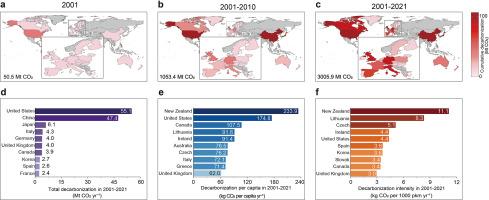2000-2021 年全球客运部门的碳排放转型
IF 10.9
1区 环境科学与生态学
Q1 ENVIRONMENTAL STUDIES
引用次数: 0
摘要
高排放、难减排的客运行业在全球深度脱碳中发挥着至关重要的作用。为引导客运行业实现公平、快速的转型,本研究首次开发了一个自下而上的建模框架,并结合最新的结构分解方法,对 28 个国家在过去 20 年中的历史排放模式和去碳化努力进行了评估和比较。结果表明:(1)2000 年至 2021 年,全球客运部门的碳排放量增加,2019 年达到峰值,人均 GDP 和人口数量是各国碳排放量增加的主要驱动因素。(2) 全球客运部门的脱碳努力因交通方式而异。贡献最大的是客车[-0.46 兆吨二氧化碳/年(Mt CO2/yr)],其次是火车(-0.4 兆吨二氧化碳/年)和飞机(-0.28 兆吨二氧化碳/年),而客车(1.04 兆吨二氧化碳/年)阻碍了脱碳进程。(3) 虽然全球客运部门已累计脱碳 3.059 亿吨二氧化碳,脱碳率达到 5.1%,但各地区的表现差异很大,进展不平衡、不充分。总之,该研究为审查和比较全球及各国客运脱碳绩效提供了一个有效的数据驱动评估框架,有助于全球排放者规划脱碳路径,早日实现零碳交通。本文章由计算机程序翻译,如有差异,请以英文原文为准。

Global carbon transition in the passenger transportation sector over 2000–2021
The high-emitting and hard-to-abate passenger transport sector plays a crucial role in global deep decarbonization. To lead an equitable and rapid transition in the passenger transportation, this work is the first to develop a bottom-up modeling framework integrated with the latest decomposing structural decomposition methodology to assess and compare historical emission patterns and decarbonization efforts of 28 countries over the past two decades. Results indicate: (1) Carbon emissions from the global passenger transport sector increased between 2000 and 2021, peaking in 2019, with GDP per capita and population size being key drivers of rising carbon emissions across countries. (2) The decarbonization efforts of the global passenger transport sector varied by traffic mode. The largest contributors were passenger buses [−0.46 megatons of carbon dioxide per year (Mt CO2/yr)], followed by trains (−0.4 Mt CO2/yr), and airplanes (−0.28 Mt CO2/yr), while passenger cars (1.04 Mt CO2/yr) hindered the decarbonization process. (3) Although the global passenger transport sector has cumulatively decarbonized 3005.9 Mt CO2 and achieved a decarbonization rate of 5.1 %, regional performance varied significantly, exhibiting uneven and inadequate progress. Overall, the study provides an effective data-driven assessment framework for reviewing and comparing global and national passenger transport decarbonization performance, which will facilitate the planning of decarbonization pathways by global emitters and the early achievement of zero-carbon transport.
求助全文
通过发布文献求助,成功后即可免费获取论文全文。
去求助
来源期刊

Sustainable Production and Consumption
Environmental Science-Environmental Engineering
CiteScore
17.40
自引率
7.40%
发文量
389
审稿时长
13 days
期刊介绍:
Sustainable production and consumption refers to the production and utilization of goods and services in a way that benefits society, is economically viable, and has minimal environmental impact throughout its entire lifespan. Our journal is dedicated to publishing top-notch interdisciplinary research and practical studies in this emerging field. We take a distinctive approach by examining the interplay between technology, consumption patterns, and policy to identify sustainable solutions for both production and consumption systems.
 求助内容:
求助内容: 应助结果提醒方式:
应助结果提醒方式:


